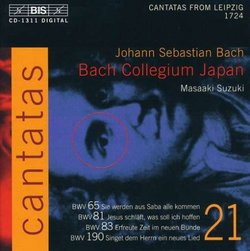| All Artists: Bach Collegium Japan, Robin Blaze, James Gilchrist, Peter Kooij, Masaaki Suzuki, Johann Sebastian Bach Title: Bach: Cantatas, Vol 21 (BWV 65, 81, 83, 190) /Bach Collegium Japan * Suzuki Members Wishing: 1 Total Copies: 0 Label: Bis Release Date: 5/27/2003 Album Type: Import Genre: Classical Styles: Opera & Classical Vocal, Chamber Music, Historical Periods, Baroque (c.1600-1750), Classical (c.1770-1830) Number of Discs: 1 SwapaCD Credits: 1 UPCs: 675754614720, 7318590013113 |
Search - Bach Collegium Japan, Robin Blaze, James Gilchrist :: Bach: Cantatas, Vol 21 (BWV 65, 81, 83, 190) /Bach Collegium Japan * Suzuki
 | Bach Collegium Japan, Robin Blaze, James Gilchrist Bach: Cantatas, Vol 21 (BWV 65, 81, 83, 190) /Bach Collegium Japan * Suzuki Genre: Classical
|
Larger Image |
CD Details |
CD ReviewsVolume 21 Jeremy D Vosburgh | West Sand Lake, NY United States | 07/11/2003 (5 out of 5 stars) "This was the fifth cd I have purchased in the Suzuki series of cantatas. I have only listened to it twice, but it is more of the same from Suzuki, and his fans will not be disappointed.The soloists are Robin Blaze (counter-tenor), James Gilchrist (tenor), and Peter Kooij (bass). Kooij has been there since volume 1 in 1995 and has only missed one volume since; he is a favorite of mine with his rich expresive voice. Blaze is also an old soul having been on these recordings since volume 9 (and missing only a couple volumes since). He has a great voice and good control, although his "good" expressiveness does not compare to Mera's (who was on vol. 2-8 missing only one) which was "excellent." James Gilchrist is the new guy. This is his first cantata recording with Suzuki. He has one of those pure voices that seem to float (ex. Agnew). He doesn't seem to have the expressive abilities of Gerd Turk (vol. 2-20 missing a couple), but hey, this is only his first volume. He sure does sound good though. :)Even though I've only listened to this cd twice I can tell that it was very good quality, and not departing from the qualities that has made Suzuki's recordings loved. Whether it is better than most of his others or not, I cannot tell yet. I do know that volumes 3 and 12 were the ones that have affected me the most.I've rated this recording 5 stars because I enjoyed it and because I could easily recommend it to anyone who enjoys Bach. Suzuki brings a freshness to Bach which so many of the other conductors these days (HIP) seem to be missing."
|

 Track Listings (26) - Disc #1
Track Listings (26) - Disc #1